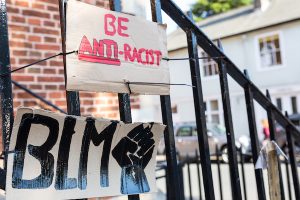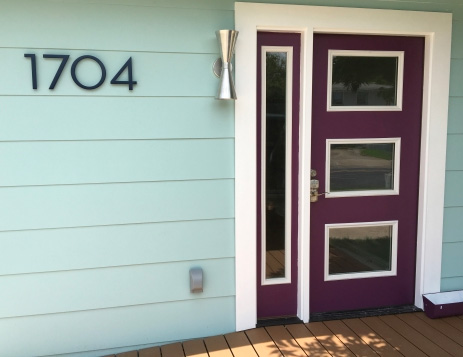 Parents, and especially White parents, have important work to embrace around being, and parenting, in anti-racist ways.
Parents, and especially White parents, have important work to embrace around being, and parenting, in anti-racist ways.
Let’s start with two steps.
#1: Understand “anti-racism.”
I believe that most everyone in my life would describe themselves as “not racist.” If asked, they would disavow racist ideas and actions. However, as I have learned embarrassingly recently, it is not enough to just be “not racist.” We have to learn how to be, and actually practice being, “anti-racist.”
Racism is a machine. A machine that influences thoughts, actions, and results. Where White people are concerned, it generally works behind the scenes, and to our benefit.
I’ve thought of myself as “not racist” my whole life, but at the same time, I was benefitting from that racist machine. I didn’t create or feed that machine, but, -and this part is important: I never used to do anything to dismantle that machine, either. (*The killer realization? Realizing that I had worked to dismantle other machines—like sexism—but the one that benefitted me, I left alone.)
If you say you “aren’t racist,” and you want to live according to your values, you must work to dismantle the racist machine. This is what being “anti-racist” means.
#2: Talk to Your Kids.
When the lessons are really important, parents teach things proactively. (eg: safety) We need to add teaching about racism to that list. We must educate our White children about racism, how White supremacy works, and ways they can help dismantle the machine. We need to speak openly about skin color and institutionalized racism in this country. We need history lessons, values-based lessons, and concrete examples in their current lives.
I bet many of you have had conversations with your kids about things like strangers, approaching houses on Halloween, looking both ways, not climbing on the fence at zoos and the Grand Canyon, etc. Parents of older kids have probably talked about vaping and dark alleys and parking lots and parties with alcohol. We do that because we believe it will help keep our kids safe. It’s (past) time White parents took the same approach to parenting about race.
Our country is literally on fire today, and no conversation around tonight’s dinner table is going to fix that. But… what if we each had a hundred conversations over the next hundred days?
What anti-racist conversation can you start at dinner tonight?
*********
Anti-Racist Conversation Ideas (aka Lessons to Share)
- Policing issues. White kids should know that black parents sit their children down and have “the talk” with them about what to do if/when they interact with police. Why isn’t that a thing in white families? Why do white families generally think of the police as public servants, heroes even, whose job it is to serve and protect, but black families generally have a different relationship with the police? Note: I do not recommend showing the George Floyd video to kids. Watching a real murder is (or should be) traumatic. Trauma doesn’t facilitate learning and growth.
- Black Lives Matter. Where did this phrase come from? Why is it offensive to instead say “All Lives Matter”?
- The tendency of White people to use calling the police as their personal enforcer when they are displeased about what someone Black is doing. (IE, BBQ Becky, Amy Cooper, Permit Patty) (If you want to go really deep—maybe with a teenager—see if you can connect this type of citizen-enforcement behavior with colonialism.) By the way, I think the Amy Cooper/Central Park a great video to show to kids, because it’s obvious racism, weaponizing white privilege, and it’s not graphic violence.
- White women as a group are known to inappropriately touch black strangers’ hair. See if you can help your child imagine a parallel between bodily boundary crossing today and slavery past.
- What are your child’s school mascots? Are they people? Why is that wrong?
- Who was the real “Jim Crow;” what’s the history there, drawing a clear line from that to why blackface is not okay.
- What was “red-lining” Does it impact your current neighborhood today? Connect red-lining and property values and acquiring inter-generational wealth.
- Does your town (or school district) have streets, buildings or statues that honor Confederate War Heroes? Were they named or erected in response to the civil rights movement?
- “I don’t see color.” What’s wrong with that phrase?
- Why is wearing a Native American headdress offensive? (similarly, the inappropriateness of wearing another culture’s traditional dress for Halloween)
- What is “voter suppression?” Consider pulling up an old “Literacy test.” My home state of Louisiana used this one—which was to be completed in 10 minutes, and one wrong answer meant the test-taker would fail. https://sharetngov.tnsosfiles.com/tsla/exhibits/aale/pdfs/Voter%20Test%20LA.pdf
- What is a “Micro-aggression?” Can your child think of any racial microaggressions they have witnessed?
- What is a “Micro-invalidation”? Has your child ever seen a teacher avoid calling the name of a child when that name looked “foreign?”
- Is there a history of white people avoiding responsibility by claiming innocent intent? Can a poor response to being told that we’ve offended make things even worse? Whose experience should be focused on?
This is all only a start. There’s more work to be done than just conversations, but we can at least start here.
Last note: I did a parenting webinar called “Talking with Kids about Race” a year or so ago with a friend and colleague: Jeffrey Swan. The webinar is now free to watch. Please do go check it out.








